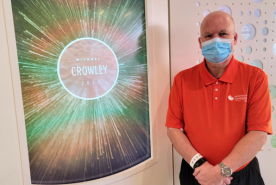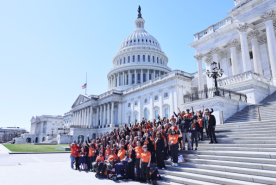April 10, 2025
“How NKF Got Here" is a series highlighting NKF’s most significant achievements over the decades. Explore the full collection of articles here.
From big hair to the rise of personal computers and the launch of MTV, the 1980s were a decade of change. For kidney patients, it was also a decade of life-saving progress.
Let's take a look at the key moments that made a difference.
Kidney Disease and Transplant Milestones in the 1980s
- 1981: Congress passed the Uniform Determination of Death Act (UDDA). UDDA created a nationwide legal standard to determine when a person is officially dead. Before this, states had different definitions of death. This created confusion, especially in cases involving organ donation.
- 1981: The first issue of the American Journal of Kidney Diseases (AJKD), a peer-reviewed medical journal for kidney professionals, was published.
- 1983: NKF Chancellor and comedian Pat Paulsen invited Congress and Vice President George H.W. Bush to the first "Donor Blitz" in Washington. The goal was to have Congress members sign organ donor cards and promote organ donation awareness at the national level.
One day, no one’s life will be lost to kidney disease.
- Equip patients and families with knowledge, resources, and access to high-quality care.
- Advocate for policies that address disparities and prioritize kidney health for all.
- Fund research and technology to advance early detection, improve treatment, and expand transplant access.
- 1984: The National Transplant Act was passed with NKF’s leadership, laying the foundation for the national transplant system.
- 1984: Before 1984, people were allowed to sell or buy kidneys. NKF opposed the commercialization of organ donation. We emphasized that transplantation should be based on medical needs, not financial ability. NKF helped ensure that organ donation remained ethical with the passage of Public Law 98-507. This prohibited the sale of organs for transplantation.
- 1984: NKF's second annual "Organ Donor Blitz" in Congress resulted in 21 members of Congress signing organ donor cards.
Subscribe today!
Join the NKF Blog Newsletter
Get inspirational stories and kidney disease resources delivered to your inbox every month. You'll gain practical insights and expert advice to help you better understand and manage your kidney health, no matter where you are on your kidney journey.
- 1986: With NKF's support, Congress passed the Omnibus Budget Reconciliation Act. This extended Medicare coverage for kidney transplant recipients' anti-rejection medications for 12 months. Medicare now covers kidney transplant immunosuppressive drugs for life, as of January 1, 2023. Before these laws, many recipients struggled to pay for immunosuppressive drugs.
- 1987: NKF awarded its first Young Investigator Grants to help early-career researchers studying kidney disease. These grants provided funding to scientists starting their careers. It gave them resources to explore new ideas and develop treatments that could improve the lives of kidney patients. 1987: NKF held its first charity golf event to raise money for patient education and kidney disease research. The NKF Golf Classic tournament continues to this day.
- 1987: President Ronald Reagan signed a bill requiring hospitals to talk to families about organ donation after a loved one passed away. Before this law, organ donation was not always discussed. Many didn't know they could donate their loved one's organs. Making these conversations a rule increased donation rates, giving more people a chance to receive a life-saving organ transplant.
- 1989: NKF played a role in securing FDA approval for Erythropoietin (EPO) to treat anemia or low blood iron in dialysis patients. Our advocates also pushed the Health Care Financing Administration (now CMS) to reimburse dialysis patients for the cost of EPO.
Shaping the Future of Kidney Disease Care Together
The achievements of the 1980s proved that advocacy, research, and education can lead to real change. But the journey doesn't stop here. The 1990s introduced even more advancements in kidney care. We'll pick up the story there next time, as we look forward to the next chapter in this important history.


















